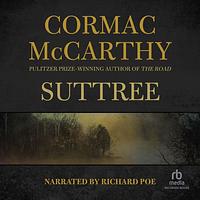You need to sign in or sign up before continuing.
Take a photo of a barcode or cover
Beautifully written, but I can’t say I cared much for the content or the titular character.
Suttree - Cormac McCarthy 9/10
Suttree is a challenging, but incredible book. From the outset it has all the trappings of McCarthy, dense archaic prose, a southern setting, a relentless severity, and yet it also quickly feels like something else. My only other substantive encounter with McCarthy is Blood Meridian, which I thought was phenomenal as well. Though the two share these superficial, if distinctive, features that mark the writer, they are incredibly different in substance. In Blood Meridian the setting is the story and the characters are paragonic archetypes deployed to unravel the theme of the time and place. This is not to say the characters in Blood Meridian are poorly written, indeed the Judge, among others, is one of the greatest characters in literature, but their problems and their struggles are not personal and existential, rather they are cosmic and metaphysical. They are of power and violence, history and war, not doubt, love, and fear. In contrast, in Suttree the characters are the story and they feel deeply real with none of the symbolic undercurrents of Blood Meridian.
Another thing both books share is McCarthy's determination to only show action and never enter the mind of a character. This is also a clear distinction from Faulkner to whom he is frequently compared. While they share much in style, Faulkner was a fundamentally psychological writer, diving into how a character's perspective was molded and how the world looked through it. McCarthy will have none of that. We will never see the world through Suttree's or the Kid's eyes. We will only see the characters as you would from the outside, an inscrutable stranger on the street whose mind is only guessed at through hints of their external behavior.
There are some cases where the book feels a little meandering - what exactly motivates his trip forest? How does his prior life fit in? I dont so much have a problem with these things coming out of seemingly nowhere as I do with some of them seeming out of character. Despite his stupid flaws, how or why he left his family feels difficult to reconcile with his efforts here and there to help people. Of course he can be conflicted or change, but with out more context it creates some dissonance for me at least. They are nonetheless wonderful scenes, I only wish I could connect them better with the character and the rest of the book. There are also some moments of lyrical or philosophical embellishment that sometimes strain credibility and the fourth wall.
These small things aside, the book is truly impressive. It is an honest book, with true human failings and struggles developed in an authentic way. They are not contrived flaws deployed to establish credibility, but are essential parts of the characters, their stories, their souls. A kind of nietzschean ethic slowly begins to accrue later in the book, though its always tentative and potential, whispering in the periphery but never quite fully achieved or consummated. By the end we feel that we have learned and there is perhaps even some hope, but we have not been robbed of these things by some cliche triumph or philosophical deus ex machina.
I strongly recommend it, accompanied by a dictionary.
Suttree is a challenging, but incredible book. From the outset it has all the trappings of McCarthy, dense archaic prose, a southern setting, a relentless severity, and yet it also quickly feels like something else. My only other substantive encounter with McCarthy is Blood Meridian, which I thought was phenomenal as well. Though the two share these superficial, if distinctive, features that mark the writer, they are incredibly different in substance. In Blood Meridian the setting is the story and the characters are paragonic archetypes deployed to unravel the theme of the time and place. This is not to say the characters in Blood Meridian are poorly written, indeed the Judge, among others, is one of the greatest characters in literature, but their problems and their struggles are not personal and existential, rather they are cosmic and metaphysical. They are of power and violence, history and war, not doubt, love, and fear. In contrast, in Suttree the characters are the story and they feel deeply real with none of the symbolic undercurrents of Blood Meridian.
Another thing both books share is McCarthy's determination to only show action and never enter the mind of a character. This is also a clear distinction from Faulkner to whom he is frequently compared. While they share much in style, Faulkner was a fundamentally psychological writer, diving into how a character's perspective was molded and how the world looked through it. McCarthy will have none of that. We will never see the world through Suttree's or the Kid's eyes. We will only see the characters as you would from the outside, an inscrutable stranger on the street whose mind is only guessed at through hints of their external behavior.
There are some cases where the book feels a little meandering - what exactly motivates his trip forest? How does his prior life fit in? I dont so much have a problem with these things coming out of seemingly nowhere as I do with some of them seeming out of character. Despite his stupid flaws, how or why he left his family feels difficult to reconcile with his efforts here and there to help people. Of course he can be conflicted or change, but with out more context it creates some dissonance for me at least. They are nonetheless wonderful scenes, I only wish I could connect them better with the character and the rest of the book. There are also some moments of lyrical or philosophical embellishment that sometimes strain credibility and the fourth wall.
These small things aside, the book is truly impressive. It is an honest book, with true human failings and struggles developed in an authentic way. They are not contrived flaws deployed to establish credibility, but are essential parts of the characters, their stories, their souls. A kind of nietzschean ethic slowly begins to accrue later in the book, though its always tentative and potential, whispering in the periphery but never quite fully achieved or consummated. By the end we feel that we have learned and there is perhaps even some hope, but we have not been robbed of these things by some cliche triumph or philosophical deus ex machina.
I strongly recommend it, accompanied by a dictionary.
The consensus amongst intelligentsia seems to be that Suttree is a departure from the typical McCarthy novel, and I agree. It’s much longer and sprawling. The plot is, well, ‘thin’ might be the best way to describe it. It took about 200 of the 570 pages before I realized that reading it as a series of short stories or vignettes was the best way to manage it. The through line, of course, is that it follows our protagonist, Cornelius Suttree over about a 4 year period intersecting with a host of colorful others including a cast of supporting regulars. The lack of plot frees the reader from having to manage the wide ranging experiences and events and attempt to generate a meta narrative — perhaps, a bit like life? While I rarely enjoy long works, eventually I did warm to this one. Some of the situations McCarthy concocted were absolutely ridiculous and hilarious (very uncommon) and others absolutely tragic (more common). In both modes, in a vein like Genet or Bukowski (and H Miller?), CMcC challenges the structures that order society to inject nobility at every strata of economic or social status.
My favorite Cormac McCarthy. But it is a long, loner, wandering story...so you have to be in the mood I suppose. But it's absolutely beautiful.
dark
funny
reflective
sad
slow-paced
An ill-fated Odyssey of the vast American underbelly (in the avatar of 1950s Knoxville). Something of a recapitulation of Les Miserables in themes, if not in outlook; a mishmash of deep, sympathetic portraiture of the marginalized with crude casual racism and pervasive misogyny. It's interesting to see McCarthy's style applied to the land of his youth rather than the bleak Southwest, but it feels wordier and less tightly structured than most of his later works.
adventurous
dark
slow-paced
Plot or Character Driven:
Character
Strong character development:
Complicated
Loveable characters:
Complicated
Diverse cast of characters:
Yes
Flaws of characters a main focus:
Complicated
challenging
dark
emotional
funny
relaxing
slow-paced
Plot or Character Driven:
Character
Strong character development:
Complicated
Loveable characters:
Yes
Diverse cast of characters:
Yes
Flaws of characters a main focus:
Yes
This book had me laughing out loud but was at times seriously depressing. This is the first book I've read where I felt that I should read it again when I'm wiser and more literate. I'm not sure I totally understood what was going on, and there were points where I had to look up what a word meant nearly every page. Ultimately though, the prose is beautiful and is effective in placing you in the scene of 20th century Knoxville with a case of entertaining yet often degenerate characters.
challenging
emotional
funny
reflective
slow-paced
Plot or Character Driven:
Character
Strong character development:
Yes
Loveable characters:
Yes
Diverse cast of characters:
Yes
Flaws of characters a main focus:
Yes
dark
emotional
reflective
sad
slow-paced
Plot or Character Driven:
A mix
Strong character development:
No
Loveable characters:
No
Diverse cast of characters:
Yes
Flaws of characters a main focus:
Complicated




